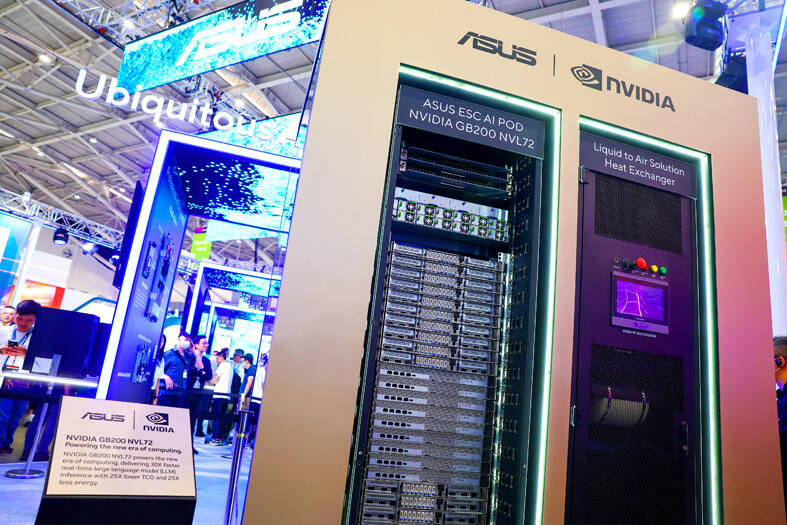Asustek Computer Inc (華碩), the world’s No. 5 PC brand, yesterday posted record quarterly net profit for last quarter, thanks to robust demand for its gaming PCs and computers with artificial intelligence (AI) features, especially from China.
The release of Black Myth: Wukong and Beijing’s economic stimulus package, which included subsidies for electronics purchasing, were the major factors that drove demand for gaming-related gadgets and AI PCs equipped with Microsoft Corp’s new Copilot features, Asustek said.
Asia accounted for 48 percent of the company’s revenue last quarter, followed by Europe at 29 percent and the US at 23 percent, it said.

Photo: CNA
Net profits increased 13 percent year-on-year from NT$11.1 billion (US$345.63 million) in the third quarter last year to NT$12.5 billion last quarter. That represented sequential growth of 6 percent from NT$11.8 billion. Earnings per share rose to NT$16.8 last quarter from NT$14.9 a year earlier and NT$15.9 one quarter earlier.
Looking ahead, Asustek said it expects PC revenue to decline 15 percent quarter-on-quarter this quarter after reaching a historical high of NT$156.74 billion last quarter, as customers became conservative about inventory buildup.
On an annual basis, PC revenue would grow 20 percent, it said.
Components, primarily motherboards, and server revenue are to grow between 5 percent and 10 percent this quarter, or an annual expansion of 30 percent, Asustek said.
“The fourth quarter is likely to be a relatively slower season, rather than a busy season, as it used to be,” Asustek chief financial officer Nick Wu (吳長榮) said yesterday.
Gross margin this quarter is expected to trend downward from 17.1 percent last quarter, given lower revenue contribution from electronic components, Wu said.
Operating profit margin is to slide to 4 or 5 percent from 7.1 percent last quarter, he added.
Overall, Asustek expects to deliver strong performance in revenue this year, Asustek co-CEO Samson Hu (胡書賓) said.
During the first 10 months, revenue swelled 19.5 percent annually to NT$483.1 billion, a company filing with the Taiwan Stock Exchange showed.
Asustek yesterday said it has secured orders for AI servers based on Nvidia Corp’s GB200 chips, with large shipments scheduled in the first quarter of next year, Hu said.
The company primarily shipped AI servers based on Nvidia’s less advanced H100 chips in the first three quarters of the year, Hu said, adding that it would be shipping AI servers with H200 chips this quarter.
Asustek is building in-house server manufacturing capacity to meet requests of cloud service provider customers, while it outsources PC manufacturing to electronic manufacturing service providers, company co-CEO S.Y. Hsu (許先越) said.
The company is building a server production line in the US, aiming to start operations by the end of this year, Hsu said.
Servers, mostly AI servers, are expected to make a greater revenue contribution this quarter, from more than 10 percent last quarter, the company said.

Hon Hai Precision Industry Co (鴻海精密) yesterday said that its research institute has launched its first advanced artificial intelligence (AI) large language model (LLM) using traditional Chinese, with technology assistance from Nvidia Corp. Hon Hai, also known as Foxconn Technology Group (富士康科技集團), said the LLM, FoxBrain, is expected to improve its data analysis capabilities for smart manufacturing, and electric vehicle and smart city development. An LLM is a type of AI trained on vast amounts of text data and uses deep learning techniques, particularly neural networks, to process and generate language. They are essential for building and improving AI-powered servers. Nvidia provided assistance

GREAT SUCCESS: Republican Senator Todd Young expressed surprise at Trump’s comments and said he expects the administration to keep the program running US lawmakers who helped secure billions of dollars in subsidies for domestic semiconductor manufacturing rejected US President Donald Trump’s call to revoke the 2022 CHIPS and Science Act, signaling that any repeal effort in the US Congress would fall short. US Senate Minority Leader Chuck Schumer, who negotiated the law, on Wednesday said that Trump’s demand would fail, while a top Republican proponent, US Senator Todd Young, expressed surprise at the president’s comments and said he expects the administration to keep the program running. The CHIPS Act is “essential for America leading the world in tech, leading the world in AI [artificial

DOMESTIC SUPPLY: The probe comes as Donald Trump has called for the repeal of the US$52.7 billion CHIPS and Science Act, which the US Congress passed in 2022 The Office of the US Trade Representative is to hold a hearing tomorrow into older Chinese-made “legacy” semiconductors that could heap more US tariffs on chips from China that power everyday goods from cars to washing machines to telecoms equipment. The probe, which began during former US president Joe Biden’s tenure in December last year, aims to protect US and other semiconductor producers from China’s massive state-driven buildup of domestic chip supply. A 50 percent US tariff on Chinese semiconductors began on Jan. 1. Legacy chips use older manufacturing processes introduced more than a decade ago and are often far simpler than

Gasoline and diesel prices this week are to decrease NT$0.5 and NT$1 per liter respectively as international crude prices continued to fall last week, CPC Corp, Taiwan (CPC, 台灣中油) and Formosa Petrochemical Corp (台塑石化) said yesterday. Effective today, gasoline prices at CPC and Formosa stations are to decrease to NT$29.2, NT$30.7 and NT$32.7 per liter for 92, 95 and 98-octane unleaded gasoline respectively, while premium diesel is to cost NT$27.9 per liter at CPC stations and NT$27.7 at Formosa pumps, the companies said in separate statements. Global crude oil prices dropped last week after the eight OPEC+ members said they would